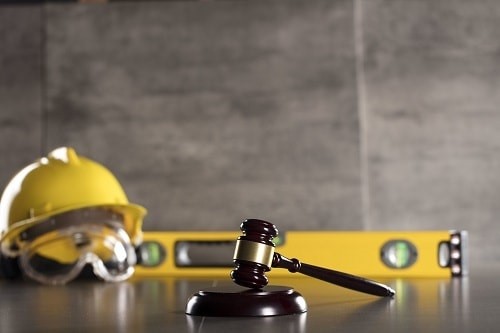Health and safety practitioners will already appreciate how extensive the duties on their companies to protect safety can be, how easy it is to fall foul of them and the importance of learning from any incidents to prevent any further serious events.
Opinion
Health and safety prosecutions: recent cases provide some important lessons
Two recent reported cases have emphasised the duty is to ensure that each and every employee is to be kept safe and that the company’s clean record, good safety culture, low accident rates and avoiding repeat incidents are now more critical than ever.
In Evergreen Construction the Health and Safety Executive (HSE) called evidence at trial of previous accidents involving the defendant company, and reported contraventions of safety laws where the company had admitted to having breached its duty. HSE argued that this was relevant background evidence to prove that the defendant company had breached the Health and Safety at Work Act 1974 on this occasion as well and so was guilty of the current alleged offence it was charged with.
 Chris Green: "Potentially all and any previous accidents or enforcement notices can be referred to by HSE in court."
Chris Green: "Potentially all and any previous accidents or enforcement notices can be referred to by HSE in court."
The criminal law has long recognised that such evidence of ‘bad character’ is highly prejudicial and not normally admissible because it tries to suggest that a defendant business is more likely to be guilty because previous contraventions show it has a propensity to commit such offences. The company appealed unsuccessfully and thus readers need to know that potentially all and any previous accidents or enforcement notices can be referred to by HSE in court.
The seriousness of any injury involved and whether or not the company was actually prosecuted is irrelevant. Particular care needs to be taken with any Improvement Notices or Notices of Contravention (NOC). Even RIDDOR reports of incidents which are similar to the current offence could demonstrate this propensity.
Often for economic or practical reasons, it is common for a company to choose not to challenge a notice – even when they might usually have good grounds to appeal and contest an allegation of breach by HSE. If the Fee for Intervention (FFI) costs invoiced are not significant, sometimes if no improvement or prohibition notice is served and no prosecution brought, then a business may decide not to appeal the HSE’s NOC, the contents of any Notice or the process it followed.
 What looks to be a minor matter with little short-term effects can come back to haunt practitioners. Photograph: iStock
What looks to be a minor matter with little short-term effects can come back to haunt practitioners. Photograph: iStock
The Evergreen judgement confirms the importance of legal advice which will often be given – namely that protection of a company’s clean safety record is of much more significance long term than just accepting allegations of breach for expediency and avoiding the process of challenge. The case makes it clear that the far more important objective is to preserve a company’s good safety reputation and preventing any breaches it might admit from being used against it in the future.
Usually when challenged the HSE will have to review the amounts claimed under FFI (which are often incorrect) and at the very least will often come back with a reduced claim for costs. They would need to ensure that the process they followed in serving the notice would survive the scrutiny of a challenge and that the wording of the notice has met the formal legal requirements when demanding works are undertaken to remedy the alleged offences that HSE say have been committed.
In the unlikely event that, following a challenge an HSE notice is upheld without any modification at all, the company is in no worse a position than if it had simply accepted a breach anyway and – most critically – the enforcement could not be used against it at a later date in the event of a repeat incident. By definition, the fact that HSE did not deem the offence serious enough to serve a formal notice or prosecute reflects the lack of public interest in taking any more serious enforcement action and an incident cannot be upgraded to a prosecution simply because a company might choose to appeal against the conduct of the HSE – which it is perfectly entitled to do in any case.
Just as a tribunal can consider evidence relevant to an alleged breach of safety after a notice is served, the same is true in response to a NOC, and HSE would have to keep the balancing exercise in mind between upholding its enforcement decision and the time, trouble, cost, and inconvenience of pursuing its response to any appeal brought.
In short, what looks to be a minor matter with little short-term effects can come back to haunt practitioners and any such notice should be considered in the same detail as more formal cases involving proceedings being taken.
Morrisons case highlights need to take full account of employees’ individual safety needs
The wide-ranging extent of a company’s duty to protect each and every employee even when they may have particular individual needs or subjective requirements has been highlighted by another recent case.
Supermarket chain Morrisons was convicted of charges brought by Tewkesbury Council following the death of an employee in one of its stores. The employee in question was epileptic and had experienced episodes both personally and while at work. Morrison’s had correctly identified the possible risk which in fact eventuated; namely that of him suffering an epileptic episode and falling on the stairs leading from the upstairs canteen to the shop floor during a shift.
The employee fell on the stairs one day while he was alone, and an episode occurred. Tragically, he later died of his injuries. Sometime previously Morrisons had gone to great lengths to make reasonable adjustments to his duties. The company changed his job role to a position based downstairs so as to reduce the number of times he had to climb the stairs. During most shifts however he still used the stairs to access his locker and was still required to go upstairs to undertake additional activities.
Morrisons was fined £3.5 million because despite taking various specific protective measures to protect that individual’s safety, there were additional ‘reasonable adjustments’ it could have made to further reduce the likelihood of falling and the consequences which could and turned out to be fatal.
Practitioners may wish to contact their HR departments to check how many existing staff members where reasonable adjustments have been made have been assessed for risks of injury and their own personal safety (rather than solely for their comfort and convenience), and whether the safety department has been notified.
HR should ask the employee to consent, and the business may wish to alert others to come forward if a particular physical or mental characteristic or requirement could increase the level of risk to that employee above the level involved in the normal day-to-day activities of the role when performed by persons who do not require reasonable adjustments to be made.
The solution needs to comply with safety laws as well as HR requirements, although the former must prevail over the latter in the common scenario where there may be a tension between the two. Practitioners may wish to review any existing epilepsy policies they have in place and/or of any other characteristics that may vary the level of risk posed to any single employee.
Once accidents or near misses occur, the business is then on notice of a risk and the onus is on them to eliminate the risk entirely if reasonably practicable will become even higher still as previous incidents will act as warnings and aggravate any future offences if and when a further event takes place.
Chris Green is a partner at Keoghs law firm and leads its crime and regulatory team across the Midlands. He specialises in providing expert advice in relation to adverse incidents and compliance with regulatory requirements. Contact him at: keoghs.co.uk/our-people/chris
OPINION

The air we breathe is all our business
By Nicky O’Malley, director of corporate partnerships, Global Action Plan on 01 June 2023
Businesses have a vital role to play in improving air quality – and the UK’s Clean Air Day on 15 June is a great opportunity for companies to begin or renew their efforts in this area.

All jobs greener: why we need workforce transformation for a sustainable future
By Martin Baxter, deputy CEO, IEMA (Institute of Environmental Management & Assessment) on 01 June 2022
The shift to a green economy will create green jobs within new and emerging sectors, while those working in existing sectors will have to gain the requisite green skills to take advantage of the business value-creation opportunities that come from embedding sustainability across the whole organisation.

Preventing chemical pollution: how the UK is falling behind Europe
By Ruth Jones MP for Newport West & Shadow Minister for Agri-Innovation and Climate Adaptation on 01 June 2023


